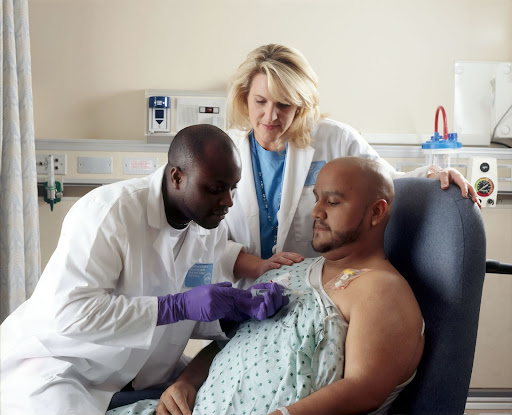Does Cancer Screening Have to be SCARY? Why You Should Let These Tests Frighten You + Recommended Cancer Screening Tests
Does Cancer Screening Have to be SCARY? Why You Should Let These Tests Frighten You + Recommended Cancer Screening Tests
Our Blog
Does Cancer Screening Have to be SCARY? Why You Should Let These Tests Frighten You + Recommended Cancer Screening Tests

As we age, we all have that dreaded conversation with our doctors, “When should I get screened for cancer?” It can definitely be scary – all those unknowns. Although many screening tests will come back negative for cancer, there are worries that can prey on you beforehand and those concerns may even delay you from getting the test done all together. But, there’s no reason to be afraid of them. In fact, it’s more scary not to get them! Here’s why, plus a list of cancer screening tests that are recommended.
Why Cancer Screening Tests Shouldn’t Be Scary
Although the unknown can be scary – What do I do if it does come back positive? – it shouldn’t deter you from getting the exams. Cancer screening tests can help identify tumors and health problems before they become more serious. The earlier you catch cancer, the higher the rate of survival. So even though you might be afraid of the “What if?,” delaying on your screening tests can have major and even scarier consequences.
And even if you’re in “good health” at the moment, that doesn’t mean you should skip screening. Some cancers don’t present symptoms until they’re very serious, but screening tests can help catch them before you even knew anything was wrong.
What Cancer Screening Tests are Recommended?
There are several tests you should get to screen for cancer. Talk to your doctor about your risk factors and when they recommend getting the test, too, as everyone’s health is slightly different.
Breast Cancer Screening
Breast cancer screening is a must in women over the age of 50, but some may be recommended getting their mammogram at age 40 depending on their personal risk. Ultrasounds may also be suggested for certain types of breasts, but mammograms are generally considered the best way to catch breast cancer early. Screening should be done every year.
Cervical Cancer Screening
Anyone over the age of 21 and under the age of 65 should be tested for cervical cancer. This includes human papillomavirus (HPC) tests and Pap tests as they can catch the health issue before it actually becomes cancer. Catching this type of cancer early can increase your chances of being cured.
Colorectal (Colon) Cancer
Colon, or colorectal, cancer can be tested through a colonoscopy, stool tests, blood tests, DNA tests, and sigmoidoscopy. Screening is generally recommended every 10 years for those between the ages of 45 and 75 and of average risk. If you have higher risk, your doctor may suggest you get tested more often.
This type of cancer usually always presents as precancerous polyps before turning into cancer. If your doctor finds these abnormal growths during a colonoscopy, they can be removed and biopsied. For those with precancerous polyps, screening may be suggested every 5 years as opposed to 10.
Lung Cancer
For individuals who have smoked in the past or currently smoke and are between the ages of 50 and 80 years old, lung cancer screening should be scheduled every year. A type of CT scan, low-dose helical computed tomography (LDCT), is used and can help reduce the chance of death in heavy smokers.
Prostate Cancer Screening
For men over the age of 40 or those younger with a family history of prostate cancer, prostate cancer screening is recommended. A prostate specific antigen (PSA) blood test done early will help set a baseline for your levels and help identify if there are issues later on in life. This screening tool, however, is only part of the process of diagnosing prostate cancer and high levels of PSA is not always an indication of cancer.
Skin Cancer Screening
If you notice any abnormal growths or changes with your skin, it’s important to schedule an appointment with your dermatologist. They can perform a biopsy and check if the issue is cancerous. You should regularly be checking yourself for growths, new moles, birthmarks, and changes in texture or shape of existing moles and birthmarks. Certain factors can increase your chances of skin cancer such as light skin tone, history of sunburns, blond or red hair, and a large number of moles.
How Else Can You Catch Cancer Early?

In order to catch cancer early, you should schedule your recommended cancer screening tests, but there are other steps you and your doctor can take to identify the disease sooner rather than later.
• Talk to your doctor about any changes with your health
◦ Certain symptoms, such as a change in your bowel or bladder habits or a
persistent cough, can be signs of cancer.
• Schedule annual checkups with your doctor
◦ These are essential to your health and well-being, too, and can help you catch
other problems before they become more serious!
• Complete lab tests
◦ They tend to include complete blood count, urine cytology, blood protein testing,
and tumor marker tests.
Although scheduling the cancer screening test can be scary, you shouldn’t let that deter you! It’s much better for your health and longevity to get screened on schedule and have regular conversations about your risk factors for cancer with your doctor.
Do you want to take control of your health? Learn more about how functional medicine works and how I can help you get more in tune with your well-being.
Sources
“5 Cancer Screening Tests & When to Get Them.” Stamford Health, https://www.stamfordhealth.org/healthflash-blog/cancer/major-cancer-screenings/.
“Cancer Screening Tests.” Centers for Disease Control and Prevention, Centers for Disease Control and Prevention, 19 May 2022, https://www.cdc.gov/cancer/dcpc/prevention/screening.htm.
“Skin Cancer Screening: Medlineplus Medical Test.” MedlinePlus, U.S. National Library of Medicine, https://medlineplus.gov/lab-tests/skin-cancer-screening/.
“What Cancer Screening Tests Check for Cancer?” National Cancer Institute, https://www.cancer.gov/about-cancer/screening/screening-tests.
“What Is Breast Cancer Screening?” Centers for Disease Control and Prevention, Centers for Disease Control and Prevention, 26 Sept. 2022, https://www.cdc.gov/cancer/breast/basic_info/screening.htm.

